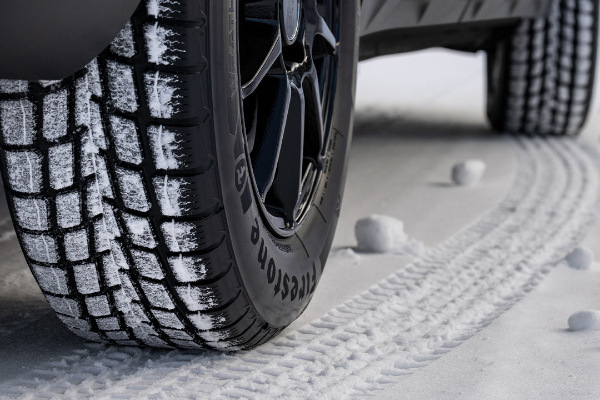The Role of Tires in Fuel Efficiency
Posted by WheelSetGo on 13th Jun 2024

The Role of Tires in Fuel Efficiency: How Different Tire Types and Maintenance Impact Your Car's Fuel Economy
Fuel efficiency is a major concern for many drivers, not only because it saves money on gas but also because it helps reduce the environmental impact of driving. While various factors influence a vehicle's fuel efficiency, one often overlooked aspect is the role of tires. Tires significantly affect a car's fuel economy, and understanding how different tire types and maintenance practices can impact this is crucial for any vehicle owner.
Types of Tires and Their Impact on Fuel Efficiency
All-Season Tires

All-season tires provide a balance of performance in various conditions, including wet and dry roads and light winter conditions. These tires typically offer moderate rolling resistance, which directly influences fuel efficiency. Rolling resistance is the energy required to keep a tire moving at a constant speed. Lower rolling resistance means less energy (and fuel) is needed to keep the car moving. While all-season tires offer decent fuel efficiency, they may not be as specialized in reducing rolling resistance as other types of tires.
Performance Tires

Performance tires are designed for enhanced handling and traction, especially at higher speeds. Made with softer rubber compounds and more aggressive tread patterns, they can increase rolling resistance. As a result, performance tires can negatively impact fuel efficiency compared to other tire types. However, for drivers who prioritize handling and speed, the trade-off might be worth it.
Low Rolling Resistance Tires
Low rolling resistance tires are specifically engineered to improve fuel efficiency by minimizing the energy loss as the tire rolls. These tires often use advanced materials and design techniques to achieve their fuel-saving benefits. Examples include specialized versions of all-season, touring, and some eco-friendly tires.
Touring Tires
Touring tires are designed for a comfortable ride and long tread life. When manufactured with low rolling resistance technology, they offer a good balance between fuel efficiency and performance. Ideal for drivers who cover long distances regularly, these tires maximize fuel savings without sacrificing comfort.
Eco-Friendly Tires
Eco-friendly tires, also known as green tires, are created with the environment in mind. Featuring low rolling resistance technology to enhance fuel efficiency, they may also use sustainable materials in their construction. Brands like Michelin's Energy Saver or Bridgestone's Ecopia are well-known for their eco-friendly tire options that improve fuel economy.
Low rolling resistance tires can significantly enhance fuel economy, often by as much as 10% compared to standard tires. For drivers looking to maximize their vehicle's fuel efficiency, investing in these types of tires can be a smart choice.
Winter Tires

Winter tires provide superior traction in snow and ice with deeper treads and rubber compounds that remain flexible in cold temperatures. While essential for safe driving in winter conditions, these tires typically have higher rolling resistance, which can reduce fuel efficiency. It's advisable to switch back to all-season or low rolling resistance tires once winter conditions have passed to maintain optimal fuel economy.
Tire Maintenance and Fuel Efficiency

Proper tire maintenance is crucial for ensuring that your tires contribute positively to your vehicle's fuel efficiency. Here are some key maintenance practices to keep in mind:
- Regular Tire Pressure Checks: Maintaining the correct tire pressure is one of the simplest yet most effective ways to improve fuel efficiency. Under-inflated tires create more rolling resistance, causing the engine to work harder and use more fuel. According to the U.S. Department of Energy, keeping your tires properly inflated can improve your gas mileage by up to 3%. Check your tire pressure at least once a month and before long trips.
- Wheel Alignment: Misaligned wheels can cause tires to wear unevenly and increase rolling resistance. Proper wheel alignment ensures that your tires make even contact with the road, reducing the effort needed to keep the car moving. Regularly checking and adjusting wheel alignment can help maintain fuel efficiency and extend the life of your tires.
- Tire Rotation: Regularly rotating your tires helps ensure even wear, which can positively affect fuel efficiency. Unevenly worn tires can create additional drag and reduce fuel economy. Most manufacturers recommend rotating tires every 5,000 to 8,000 miles, but it's always best to check your vehicle's owner's manual for specific recommendations.
- Balancing: Properly balanced tires are crucial for a smooth ride and optimal fuel efficiency. Imbalanced tires can cause uneven wear and increase rolling resistance. Having your tires balanced during rotations or when you notice vibrations while driving can help maintain fuel efficiency.
Wrapping Up
Tires play a significant role in a vehicle's fuel efficiency, and understanding the impact of different tire types and maintenance practices can help you make informed decisions. Whether you opt for low rolling resistance tires to maximize fuel economy or ensure regular tire maintenance to keep your car running efficiently, paying attention to your tires can lead to significant savings at the pump and a smoother, safer driving experience.
At WheelSetGo, we offer a wide range of tires to suit every need and provide expert advice to help you choose the best options for your vehicle. Drive smart, maintain your tires, and enjoy the benefits of improved fuel efficiency. For personalized assistance, feel free to contact us at 320-247-6160.
